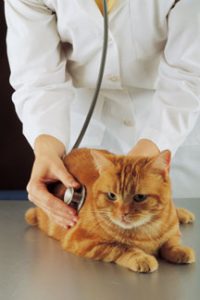Radiology (X-rays)
When we need to figure out what’s wrong with your pet, we routinely use x-rays to help identify the cause of the problem, rule out possible problems, or provide a list of possible causes. We may also use x-rays during a wellness exam to diagnose potential problems before they become serious.
X-rays provide valuable information about a pet’s bones, gastrointestinal tract (stomach, intestines, colon), respiratory tract (lungs), heart, and genitourinary system (bladder, prostate). We use radiology alone or in conjunction with other diagnostic tools. Interpretation of radiographs requires great skill on the part of the veterinarian.
We are proud to offer digital radiology (x-rays that are captured digitally rather than on film). This state-of-the-art technology allows us to provide you with a quicker diagnosis for your pet. Plus, it uses less radiation than traditional x-rays.
To avoid a blurry image, pets need to remain completely still while an x-ray is taken. In some cases, we may need to sedate your pet or use short-acting general anesthesia.
If you have any questions about our radiology service or what to expect during your pet’s procedure, please don’t hesitate to ask.
Dermatology (Skin)
Skin problems are common in dogs and cats and can be caused by hormonal disorders, allergies, infections, or parasites such as fleas and mites. These issues can be particularly difficult to treat and should be addressed promptly.
We can often diagnose a skin problem by simply examining your pet. Some dermatologic diseases or conditions do require additional diagnostic procedures to ensure a correct diagnosis. Depending on your pet’s symptoms and the results of our physical exam, we may run blood work or perform a urinalysis, skin scraping, or biopsies.
Contact us if you notice your dog or cat scratching excessively or if he or she develops any bare patches, scabs, scaling, redness, inflammation, lumps, or bumps.
Cardiology (Heart)
Although heart problems are found more often in older pets, these conditions can affect pets at any age. Heart disease is usually a life-threatening condition, but early diagnosis and appropriate therapy can extend your pet’s life. If caught soon enough, some forms of heart disease can be cured.
Heart disease can lead to congestive heart failure (CHF), which occurs when the heart can no longer pump blood effectively. If an animal is suffering from CHF, fluid usually accumulates in and around the lungs and sometimes in the abdomen. Congenital heart disease (animals born with a heart problem), valvular heart disease (abnormalities of the heart valves), arrhythmias (rhythm disturbances), and heartworm disease can all lead to CHF.
Call us if your pet starts breathing rapidly or coughing, loses his or her appetite, tires easily, seems weak, or has trouble exercising. We can discover many heart problems during a physical exam. Additional tests, such as an electrocardiogram (ECG), radiographs (x-rays), and ultrasounds, are usually needed to accurately identify the cause of the heart disease or failure.
 Medical Assessment
Medical Assessment
To ensure a proper diagnosis, we often need to examine your pet. We begin a medical assessment by looking at your pet’s eyes, ears, and skin and checking his or her cardiovascular, neurological, gastrointestinal, and skeletal systems for any abnormalities. We will perform blood and/or urine tests as necessary to check your pet’s kidneys, liver, pancreas, and endocrine system, including the thyroid and adrenal glands. Based on your pet’s condition, we may recommend further diagnostic tests, such as radiography (x-rays), endoscopy (internal scoping), ultrasound, or biopsy.
If you’re concerned that something may be wrong with your pet, please call us to schedule a medical assessment. Depending on the symptoms, we may ask you to bring in your pet right away.
